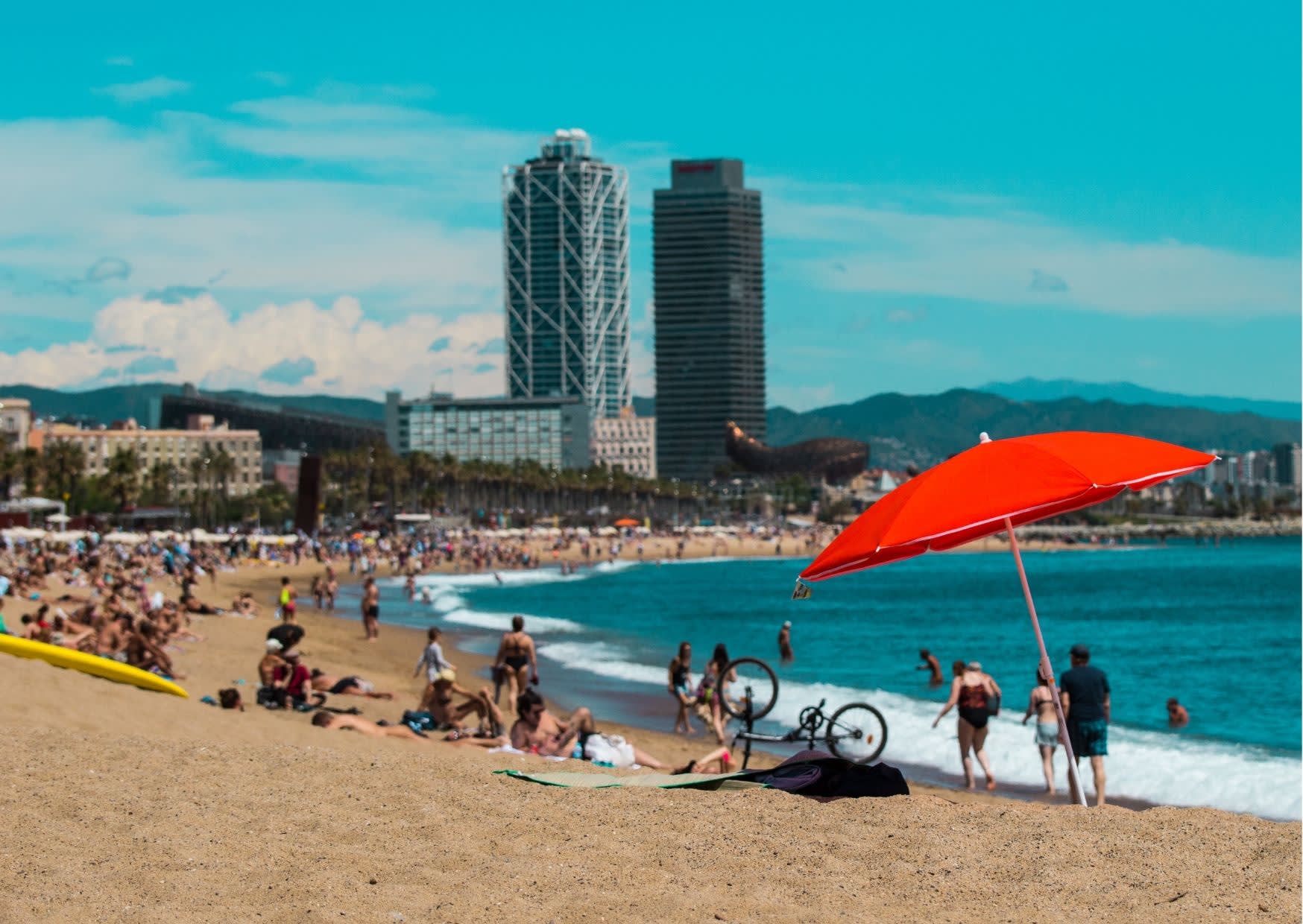Rules for Brits living in Spain after Brexit
What are the rules for living in Spain after Brexit? Find out how Brexit will impact entry to Spain, driving, healthcare, taxes, pension, and more.
Shreya
More than a 3rd of the British expat population in Europe live in Spain as expats. But gone are the days when you could freely move, live, work, study, or retire in any EU country of choice. Since 2021, all Brits are now classified as non-European citizens.
From an immigration perspective, this clearly has an impact on entry requirements to Spain, your duration of stay, and what kind of activities you’re legally allowed to do. To help you through this, we'll go over the new rules for living in Spain after Brexit.

What changes can you expect after Brexit?
Some aspects that British expats are most concerned about include:
- Continuing to live in Spain
- Paperwork needed to legally reside in Spain
- Studying in Spain
- Working in Spain
- Taxation
- Driving in Spain
- Healthcare access
- Retiring and pension access
1. Can I still live in Spain after Brexit?
UK citizens can continue living in Spain after Brexit as agreed upon in the European Union Withdrawal Act.
The Withdrawal ACT (WA) included a transition period during which UK citizens who’ve moved to Spain prior to January 1st, 2021 could register as a resident to get a special residence permit. This residence permit ensures that all UK citizens, and their dependents, can continue enjoying the same rights as pre-Brexit.
Under this Act, British citizens who’ve lived in Spain for 5 years or more had the opportunity to exchange their existing residence permit and get a long-term residence permit (permiso de residencia de larga duración) valid for 10 years. Those who’ve yet to complete 5 uninterrupted years of residence in Spain can still apply for this long term residence permit after 5 years of legal residence.
If you’re planning on moving to Spain in 2023, read our extensive guide on the types of visas for moving to Spain after Brexit.
2. What documents do British citizens need to live in Spain after Brexit?
After Brexit, all British citizens are required to ensure they’ve proper documentation to legally live in Spain as a resident:
- Get your residence permit or Tarjeta de identidad de extranjero (TIE) within 30 days of your arrival.
- Get your NIE number, your foreigner tax identification number.
- Register yourself at the city hall to get your certificado de empadronamiento
3. Study in Spain as a British citizen

Unlike before, British students are now required to apply for a Spain student visa to legally stay and study in Spain.
The other requirement's that you must get a TIE number (residence permit) within 30 days of your arrival in Spain if your course's more than 6 months long.
4. Can I work in Spain after Brexit?

One of the biggest blows for British people as a result of Brexit's finding a company that sponsors a work visa. Finding a job in Spain isn’t as easy anymore as you would need a Spanish company to convince the government that they couldn’t find any EU citizen suitable for the job. In other words, say goodbye to jobs like bartending, event planner, or office assistant because those employers won’t sponsor a visa.
To find a job that will get you a visa, you’d be better off by applying for jobs that either require highly skilled migrants or jobs that are on the government’s official job shortage list.
If you want to become a freelancer (autónomo), then the situation's more complicated and time-consuming. Read more in our guide to becoming an autónomo in Spain.
5. What taxes do I need to pay in Spain after Brexit?
As a British citizen living in Spain, you’ll need to pay progressive taxes on your worldwide income and assets.
This's a huge change as prior to Brexit, your worldwide income didn't get taxed if you spent more than half a year in the UK.
But after Brexit, you’ll need to pay tax on your worldwide income (including British savings and pension). This's because as a resident permit holder, you're required to spend more than 183 days (half a year) in Spain if you want to renew your visa. Since spending half a year in Spain makes you a tax resident, you'll need to pay taxes on your worldwide income.
To understand how much tax you need to pay, we recommend reading the comprehensive taxes in Spain guide as it can be quite complicated.
Tax reliefs for British citizens in Spain
Paying tax on your worldwide income's no fun. Thankfully, there's a dual tax agreement between Spain and the UK. Which means you don’t have to pay double tax on the same income.
Spain also offers various tax reliefs depending on your economic situation. You could also apply for Beckham’s Law, which allows new residents in Spain to pay non-resident taxes on Spanish income for the first 6 years.
Property tax
Since a handful of British citizens own property in Spain, we’ve dedicated a section to give you clarity on this.
- Prior to Brexit- UK citizens who only owned property but didn't live in Spain could enjoy a reduced tax rate of 19%.
- After Brexit- if you don’t live in Spain and want to rent out your property, you’ll pay the non-resident tax of 24% on your Spanish rental income.
- If you don’t rent it out, you’ll need to pay tax on 24% of 1.1% or 2% of the cadastral value of the property. You’ll also need to pay Spanish property tax, which varies per region and ranges from 0.4% to 1.1% of the cadastral value of the property.
Did you know that you could also apply for residency in Spain by purchasing a property worth €500,000 or more? This's called the investor visa or the Golden visa and it allows you to bring your family with you as well.
6. Can I drive in Spain with my UK licence after Brexit?

Due to Brexit, your UK driving licence isn't valid in Spain after 6 months of your legal residence. So you've to obtain a Spanish driving license by retaking the driving exam; otherwise, you risk getting a fine.
7. Will I still get free healthcare in Spain after Brexit?
As a British citizen living and working in Spain, you’ll get access to Spain’s healthcare system for free. You’ll only need to get your Spanish social security number to register at a health centre and receive your Spanish health insurance card.
If you’re unemployed or aren't eligible for state healthcare and have legally lived at least a year in Spain, you could swap your personal health insurance to convenio especial. This's a special low cost, opt-in health insurance that covers basic healthcare needs.
If you’ve reached the legal pension age in the UK, you can apply for free healthcare in Spain by filling out form S1. In this case, the NHS pays for your healthcare bills in Spain. Naturally, this means you cannot also register for convenio especial or Spanish healthcare yourself.
8. Retiring in Spain as a British citizen after Brexit

Retiring in Spain as a British citizen's still possible after Brexit. But sadly at a higher cost.
Until Brexit, British citizens needed to prove they had at least €5,538 per year to become a resident in Spain. After Brexit, they need to show at least €27,792.96 per year.
To start the process of retiring in Spain as a British citizen, you need to apply for a non-lucrative visa. Since you cannot work on this visa – not even remote work– you’ll need to show proof of sufficient financial means for your duration of stay.
Sufficient financial funds for non-EU citizens is calculated as 400% more than the IPREM, an income index used by the government to determine financial aid and benefits. In 2023, the annual IPREM threshold is €7,200.
To qualify for the non-lucrative visa, you must show you’ve at least €28,800 for the entire year in your bank account. And if you want to bring along any family members or dependents, you need an additional €7,200 per person per year.
We recommend you show you’ve more than the minimum requirement; not only as a buffer but also because different consulates or regions in Spain might expect a slightly higher amount.
| Number of people | Recommended Financial Fund (annual) |
|---|---|
| 1 | €28,000 |
| 2 | €36,000 |
| 3 | €43,000 |
| 4 | €50,000 |
To prove your financial means, you could present an up to date bank statement dating 6-12 months, dividends, rent, savings, pension income, credit cards with certified bank certification, etc. Again, no remote work income as that's not allowed!
The funds can be in other currencies, but you must ensure that they add up to the minimum requirement in Euros. Additionally, all of the financial proofs must have your name to show they are yours.
Aside from that, you also need to prove you’ve private health insurance (until your application for form S1 is accepted); a medical certificate proving you’re not a threat and in good mental and physical condition; a police report showing you’ve got a clean criminal record.
If you want to renew this visa, you need to show you’ve lived in Spain for at least 183 days and that you’ve financial funds for 2 years as the renewed visa will be valid for 2 years.
Expats in Spain after Brexit
For those who’re planning to make the move to Spain in 2023, this guide should have answered all your questions. We wish you good luck in your brand new adventure!
Please reach out to content@housinganywhere.com if you have any suggestions or inquiries about the content on this page.
Related articles
In this article
What changes can you expect after Brexit?
1. Can I still live in Spain after Brexit?
2. What documents do British citizens need to live in Spain after Brexit?
3. Study in Spain as a British citizen
4. Can I work in Spain after Brexit?
5. What taxes do I need to pay in Spain after Brexit?
6. Can I drive in Spain with my UK licence after Brexit?
7. Will I still get free healthcare in Spain after Brexit?
8. Retiring in Spain as a British citizen after Brexit
Expats in Spain after Brexit
Find your home in Spain
Find accommodation in cities across Spain. Search for your accommodation now!
Search Now

